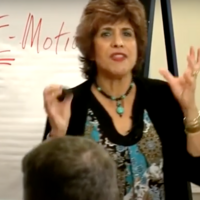

News

Are You Or Your Employees Burning Out?

Wisdom For Creating Profitable Companies Powered By Positivity
Burnout has become a crisis in recent years with rates climbing to 77% in 2023. It is a serious problem that affects many employees.
1. Are you experiencing burnout in your job?2. Are you a manager or supervisor who wants to prevent burnout and create a more positive work culture?
3. Are you interested in improving your overall well-being and find fulfillment in your work?
If you answered YES to any of these questions - you are not alone. JoAnna Brandi is very insightful on the "happiness in the workplace" topic. JoAnna is a Certified Chief Happiness Officer, workshop leader, consultant, Happiness Coach, and the author of three books. She is the creator of the popular online course, The Practice of Positive Leadership: Use the Science of Happiness to Keep Employees Engaged and Customers Happy.
Below, JoAnna discusses how organizations can take steps to reduce burnout by focusing on engagement, well-being, and strengths. She suggests that burnout-free employees are more engaged, experience a high well-being, and overall enjoy working in a culture that celebrates their strengths. She emphasizes the importance of building a positive culture and creating a shared sense of purpose to boost productivity and retention.
- - -
Are You Or Your Employees Burning Out?
I sure hope not, but it’s quite possible you have a few who are feeling a little singed.
When I was at the beach walking this morning “musing” on what I would write about the only word I heard was “burnout.” It’s a word I have personal experience with, so I came home and decided to do a little research.
There is a ton of info out there on it now, since it’s crept up to crisis proportion! The rates of burnout have been climbing steadily every year. In 2021 it was reported to be 13.5%. In 2002, 59%, and now it’s at 77%! YIKES!
- • Well, guess what? This happiness coach found you a “Shine the light on what is right” moment. I discovered that Gallup had done some investigation into the “burnout-free” employees out there. Yep, they exist. Let’s see what these folks have in common.
- • First and foremost – burnout-free employees are engaged at work.
- • Engaged employees know what's expected of them, have what they need to get their work done, and have a leader who helps them manage their workload, collaborate effectively, and see a clear path to a bright future. (I know it sounds like a lot, but it’s actually doable. I know because my clients are doing it.)
- • Burnout-free employees experience high well-being.
- • These lucky burnout-free peeps work in a culture that celebrates their strengths. When we are using our natural talents and building on what we do best, we are more likely to enter what Mihaly Csikszentmihalyi calls a "state of flow." Now that’s happiness!
One person might reach this state by having meaningful conversations with others, some while reading spreadsheets. Regardless of what it is, uninterrupted, focused time doing what you are good at is critical to avoiding burnout.
So what can you do to help reduce burnout while engaging the best in your people?
• First, establish mutual expectations and priorities. After 33 years of consulting, I can’t tell you the number of times employees confided in me that they didn’t mind the extra work. What they minded was that leaders kept piling work on to them, without helping them prioritize it. Duh.• Give people the resources they need and get rid of any barriers that cause unnecessary stress. Those are often called “Sacred Cows. Slay them. And make sure people see you do it!
• And of course – show how much you care! Ask for opinions, recognize contributions, and be genuinely interested in people’s well-being. Laugh with them often.
• Plus, your remote workers may need a little special care, they've been the most at risk for burnout throughout much of the pandemic.
• Check in with them more frequently, and be mindful of the communication and collaboration challenges that are part of remote work.
• Be proactive. Help employees feel connected to their colleagues. Create professional development opportunities for remote workers. (Ask me about my fabulous “lunch and learn” program, Don’t Believe Everything You Think! People rave about it! It’s compelling, science-based, and delivers 7 simple strategies for changing your stressful reality.)
• Positive leaders know how to help people spend most of their time playing to their strengths. They build collaboration which lessens stress on other team members. A Positive Leader inspires a shared sense of purpose and builds strong teams.
When you have genuine "I-care-about-you" relationships with your team members they make their work and life fit better together.
The pandemic years have made one thing clear: the organizations that win the talent, customers, and profits of the future will be those that care for their employees best.
While managers play an essential role in decreasing burnout, of course, the ultimate responsibility falls on the leadership team that is building the culture.
• The right kind of culture supercharges engagement, well-being, and strengths.• It provides the mindset, programs, policies, training, and support to make thriving lives possible.
• When you create thriving workplaces, they not only solve retention issues but also boost productivity.
• If you are reading this “Museletter” you are probably on your way to that kind of culture, if not there already.
• If you are not there, know that cultural transformation doesn't happen overnight. It takes a serious, long-term commitment from executive leadership.
We all have a role to play. Let’s make burnout a thing of the past. Burnout isn't inevitable. By focusing on engagement, well-being, strengths, AND OF COURSE HAPPINESS, you can decrease burnout while increasing productivity.
By JoAnna Brandi, Certified Chief Happiness Officer